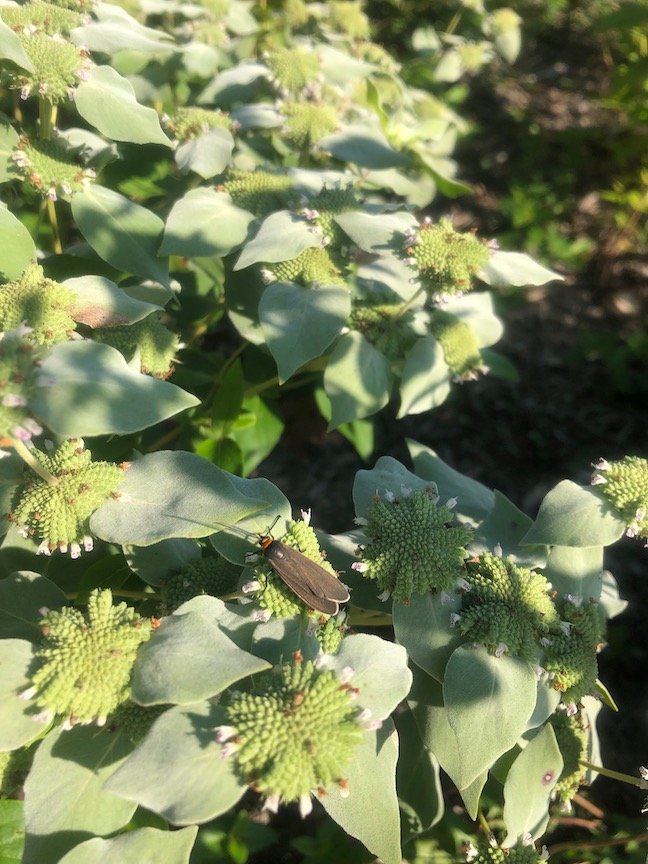Pollinators: From Milkweed to Mountain Mint
By Doug Oster
As Pollinator Week begins, Mark Miller will coordinate and be part of a host of programs at the Pittsburgh Botanic Garden in Oakdale, Pa., where he is education and exhibits director. The long-time organic gardener puts the week into perspective by proclaiming, “pollinators are incredibly important to life on Earth.”
The beautiful Hillside Pollinator Garden is one way Miller and his team are working to help pollinators, who in turn, help the gardener. “It is filled with native plants to the Allegheny Plateau and they are supportive of a wide range of pollinators,” he says, of the garden. “Keep in mind that pollinators come in many different forms. We tend to think about bees, mostly, but it's also hover flies, beetles, bats, birds, and even mammals,” Miller adds.
Joe pye weed in the Hillside Pollinator Garden is a native plant that attracts pollinators. Photos by Doug Oster
Milkweed is one of the most important plants in the garden, as it’s the only species that Monarch butterflies can use as a host plant. “The butterfly will only lay its eggs on the plant, he says, and it's the sole source of food for the monarch caterpillar.” Like many pollinators, monarchs are in decline, and he’s helping educate gardeners on the benefits of assisting a wide range of pollinators. Milkweed is just one example of the many different cultivars growing in the garden. “Our goal is having something in bloom in almost every season so that we can support many different kinds of pollinators,” Miller says.
A monarch caterpillar crawls along a leaf at the Pittsburgh Botanic Garden.
Mountain mint is one of his favorite native plants which attract pollinators, as it’s intensely fragrant, beautiful, and when in bloom, draws a variety of beneficial insects to the flowers. “It's so heavily covered with pollinators, that you hear it before you see it, he says with a laugh, you actually hear the buzzing on that plant before you get to the clump.” The garden is filled with natives and Miller explains their importance. “Well, native plants provide nectar and pollen that native pollinators are used to, they coevolved together for millions of years, and it's important for them to have those native nectar and pollen sources.”
Mountain mint in the Hillside Pollinator Garden can be covered with buzzing pollinators. It smells wonderful and is beautiful too.
The Pollinator Trail at the garden is a permanent exhibit at the PBG, teaching the importance of pollinators through a series of interactive stations. They are located throughout the garden. There’s even an apiary where kids (of all ages) can pretend to be a beekeeper and get a picture in a bee suit.
Miller has plenty of ideas for homeowners too, on how they can help pollinators. “You want to provide them what they're looking for, which is food or nectar. Providing flowering plants that provide good nectar for pollinators is very important.” The pollinators are also after water he says, so a shallow bird bath will help. “You can't have it be too deep, because butterflies, for example, want to alight. Maybe you put some stones in the middle of the bird bath and the pollinators can stop and sit or stand on the rocks, and then they can sip the water easily.”
Shelter is also an important factor. Pockets of leaf litter and adding bee hotels will help. “So really they're looking for the same things that humans are looking for,” Miller says. “They're looking for food, they're looking for water, they're looking for shelter.” Pesticides, herbicides, and other chemicals should be avoided too. “I personally don't use chemicals in my garden they can kill winged things indiscriminately, he says, and that's very bad so I highly recommend being an organic gardener.”
Miller is passionate about helping pollinators as they are a huge part in the web of life. “They're important to plants because they are aiding and sometimes the sole motivator or mechanism by which plants reproduce. As we know, plants are the basis for almost every ecosystem on Earth; So without them, we can't support other wildlife and the other organisms. And in terms of humans, pollinators are responsible for a large chunk of what we eat. Without them, we wouldn't have almonds or tomatoes or peaches or coffee or all the things that we rely on.”
Pittsburgh Botanic Garden Pollinator Week programs and events include a Support Our Pollinators Camp for children, Stingless Bees Curiosities, Master Naturalist: Pollinator Walks, Support Pollinators: Beedazzle Your Own Native Bee Box and more. The entire schedule for pollinator events at the Pittsburgh Botanic Garden can be found here.
Local Giant Eagle Market Districts are selling reusable grocery bags with a “Hive to Thrive” design. One dollar from each bag will be donated to the Pittsburgh Botanic Garden in support of Pollinator Education. There’s more information here.



